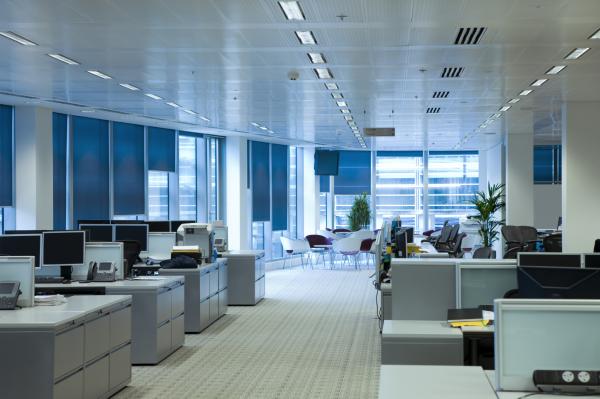14 February 2014 | Updated 01 January 1970
New research by management consultants and workplace specialists AWA shows that the office workplace is a poorly used asset. Offices are available for occupancy for 365 days a year but only open 12 hours a day most days and are unused at weekends. Even when office workplaces are open, desks are only used on average 59% of the time and meeting spaces 39% of the time.
AWA also reveals that drop in desks are not widely used and that London offices work a bit harder than workplaces outside the capital.
The good news is that well designed programmes for agile or advanced working can boost desk utilisation to as much as 80% without adversely affecting productivity.
Frightening truths
The ‘Utilisation of the Office’ report, based on AWA’s work with organisations over recent years, sets out some frightening truths about the way in which the workplace is being used (or not) and points at ways underutilised capacity can be used to get a better deal for people and shareholders.
AWA says that one reason for the poor use of office space is that the architectural and interior design professions tend to follow a ‘data less’ approach. Too often briefing starts with what people want, as opposed to what is demonstrated to be needed through thorough analysis. “We would implore architects and interior designers to adopt an evidence-based approach to briefing and design, so that a proper understanding of how people work and their use of and need for different spaces is considered,” says AWA managing director Andrew Mawson.
“In recent months we have been considering the relationship of space utilisation to sustainability. We’ve concluded independently that the most powerful way to reduce CO2 is to use fewer buildings by consolidating occupancy and increasing utilisation through agile working.”
Behavioural change challenge
Many new, small organisations are able to adopt an agile workplace model from their inception, because the leaders set out the model as part of the vision for the firm. For large organisations, with engrained rituals, cultures and attitudes, the challenge is much greater requiring substantial, well resourced and well thought through behavioural change strategies. AWA says the transition to agile or advanced working can be a substantial behavioural change challenge for large organisations.
Information technology is a key enabler in supporting mobility, both in and out of the office. Staff need to be able to make and receive calls and access their information and applications from anywhere inside the office and in some cases outside too. IP telephony and desktop ‘virtualisation’ are key technologies in supporting increased office utilisation.
AWA recommends that real estate and facilities management professionals build good relationships and alliances with their colleagues in IT, to influence and support, sometimes financially, plans to create a platform for agile working.
In support of an evidence-based approach AWA says the first thing organisations should do to understand the use of their workplaces is to carry out regular (at least once a quarter) studies to assess the utilisation of space through time. This will draw management attention to new opportunities and can support consolidation of space or in a growth situation, avoidance of the need for more space.
Research
The Utilisation of the Office report sets out the background to office utilisation; definitions of measurements; average utilisation levels for desks and meeting spaces; reasons for utilisation ‘leakage’; comparisons for London against the rest of the UK and mechanisms for increasing workplace utilisation without impacting on personal productivity.
For the last 20 years organisations, largely driven by cost pressures, have been improving the efficiency of their space by conventional means, introducing open plan accommodation and reducing the number and size of individual offices, reducing the size of desks and so on. However, there is a limit to what can be achieved in taking this conventional approach to increasing building capacity.
For some time, enlightened organisations have recognised that the capacity of a building is measured not only in terms of space, but also in the time it is made available. Each desk, meeting room and ancillary space is available for occupation 24 hours a day, 365 days a year, yet in practice most buildings are unused at weekends or outside a 12 hour daily window. Worse still, AWA’s research shows that during the time when buildings are open for occupation, the desks and meeting spaces within them are only used for a fraction of the time they are available.
For most people we would estimate that they may not be at their desk for 20% or more every year.
Further inefficiencies come from the departmental ‘ownership’ of space in offices, where typically a department is allocated an area of the building or number of desks and it regards them as its own to do with as it wishes.
In addition to these inefficiencies, the way traditional architects and interior designers go about determining the number, size and type of spaces (which is largely on the basis of asking managers what they want) has led to further inefficiencies. AWA’s research suggests that meeting rooms are generally too large for the size of meetings that take place and poorly used.
Technology
AWA suggests we are now seeing a transition in the use of information and communications technology. Until recently, ICT developments have been deployed for more mobile workers who work a substantial part of their time outside the office. Now technologies such as IP telephony, cloud computing, and virtual desktop infrastructure (VDI) are increasing the opportunity for mobility for all staff working in offices.
Article written by Richard Byatt | Published 14 February 2014
Share
Related Articles
Mercury Rising, Straw Dogs, Hot Fuzz, Top Guns, The Crown & Vikings
We've got an FM Digest so good you'd almost want to make a movie out of it. Mercury have taken the Almac contract; Elior are eliminating plastic straws; Tenon are...
Read Full Article
Skanska Wins Contract for 20 Ropemaker Street
Skanska has won a £240 million contract to construct 20 Ropemaker Street in Central London for Great Elm Assets Limited, in association with Old Park Lane...
Read Full Article
X Marks The Spot Of The Tallest Tower In Town
The City of London Corporation has approved 1 Undershaft - AKA The Trellis - which will be the second tallest building in the Capital after The Shard and thus the second...
Read Full Article
Airline Company Guilty For Unsafe Operation of Passenger Lift
Flybe, the airline company, was sentenced on 4 February 2020 for the unsafe operation of a passenger lift. Meanwhile, a number of other firms have found themselves...
Read Full Article
A Top Ten Guide To Making Your Venue More Accessible
Eight venues have received awards from the disabled access charity Euan’s Guide for their work welcoming disabled visitors – and this prompted ThisWeekinFM to...
Read Full Article
Tackling The People Challenge Through Technology
Report - CBRE and ThisWeekinFM recently lead a delegation of experts to provide a briefing on technology in workplace and real estate strategy.
The breakfast briefing...
Read Full Article
Net Zero Rush-Through Criticised By Lords, Forum Claims
The Global Warming Policy Forum has claimed the House of Lords has rebuked the Government for rushing through a commitment to a Net Zero economy.
The Forum refutes the...
Read Full Article
Holland Match - It's All Gone Gooee Over There
ProptTech history has been made with global M&E firm Croonwolter&dros agreeing to connect the 5,000 commercial buildings it runs in the Netherlands to the...
Read Full Article
'IRA' Claim Parcel Bomb Responsibility In Correctly Coded Call
A claim has allegedly been made on behalf of the ‘IRA’ for the parcel bombs that were delivered to premises in the UK - using a recognised codeword.
A call...
Read Full Article
Emcor UK Takes Insurance On TFM Contract
Emcor UK, has been awarded a contract with multinational insurance company RSA Insurance Group which is being described as a total facilities management contract. It will...
Read Full Article


.png)
.gif)
.gif)
.gif)




.png)

.png)
.jpg)





.jpg)



